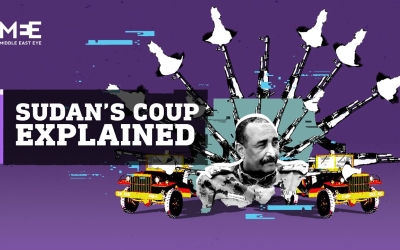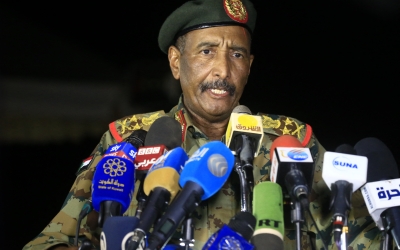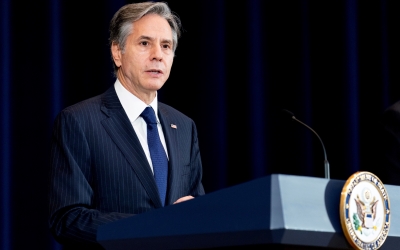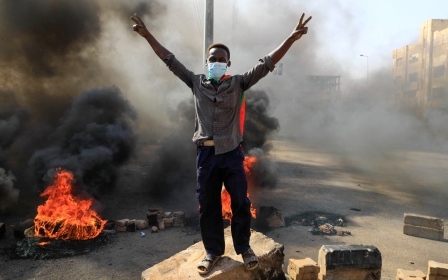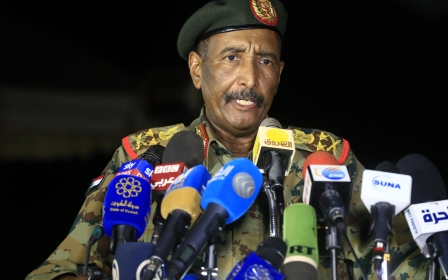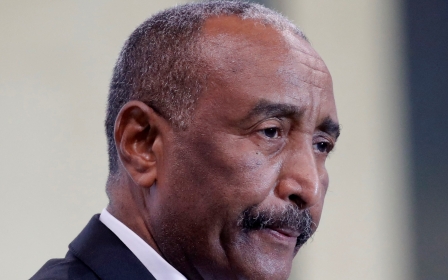Sudan coup 2021: Protests rage against army takeover as prime minister allowed home
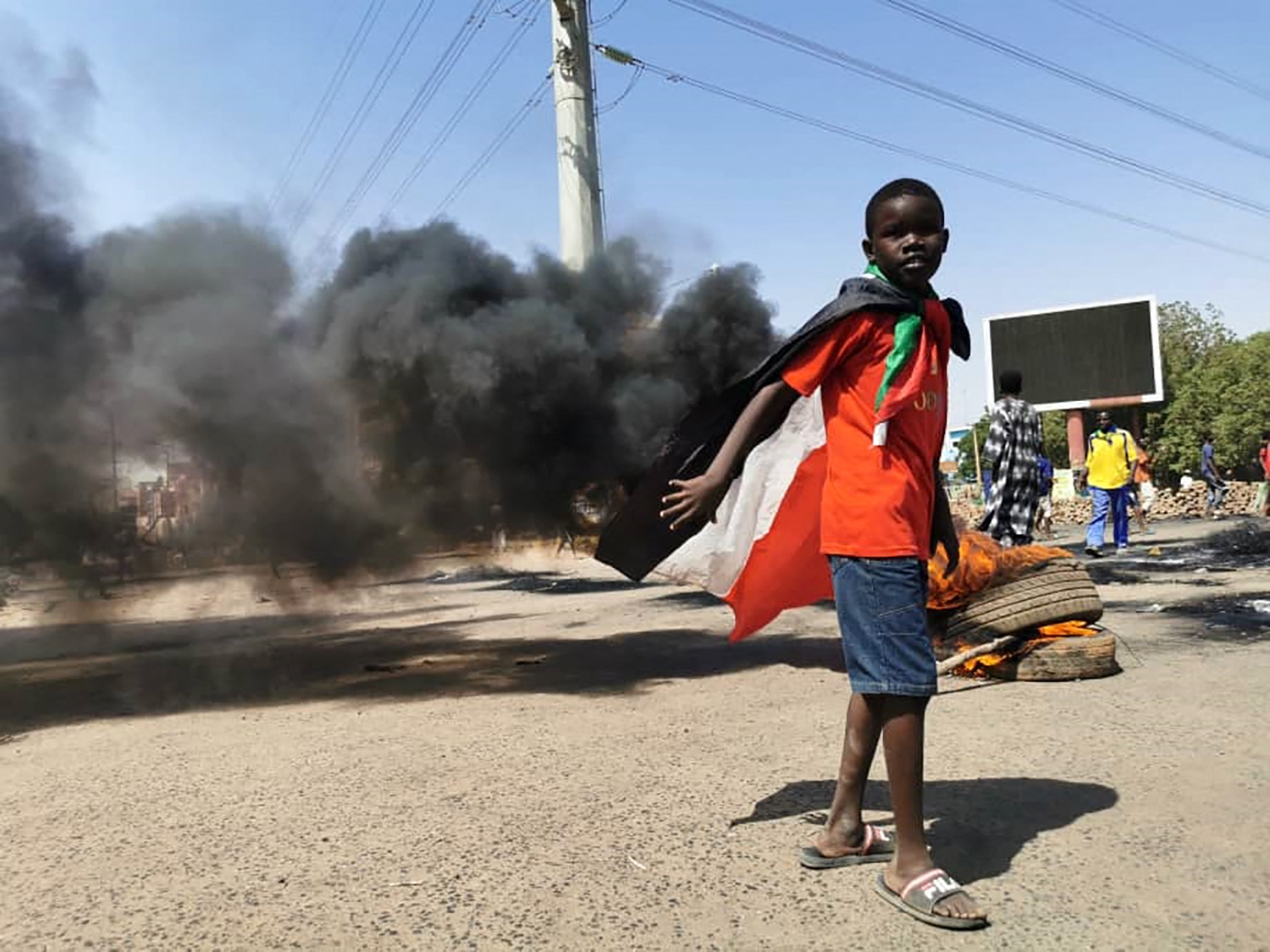
Defiant protesters rallied across Sudan on Tuesday as Prime Minister Abdalla Hamdok was allowed to return home, a day after the country’s military detained him after seizing power in a coup.
A source close to Hamdok told Reuters the premier and his wife remained under tight security and family sources said they were unable to contact them by phone.
Despite international condemnation of General Abdel Fattah al-Burhan’s power grab, several members of the country's transitional government remain detained and arrests have continued.
Witnesses told Reuters unidentified people on Tuesday had arrested Faiz al-Salik, a former media adviser to Hamdok.
Siddig Alsadig Almahdi of the Umma Party, which had a representative on the country's ruling Sovereign Council, was arrested at his home, and activist Ismail al-Tag, a lawyer who was active in the 2019 anti-Bashir protests, was also arrested, Foreign Minister Mariam al-Sadiq al-Mahdi told Al Jazeera TV.
US Secretary of State Antony Blinken spoke with Hamdok on Tuesday, welcoming his "release from custody" and reiterating a call for the Sudanese military to release all civilian leaders in detention, the State Department said.
Protests continue
Footage shared online showed heavily armed Sudanese army forces fanning out across the capital on Tuesday, with protesters waving flags, chanting slogans and blocking roads leading to Khartoum.
The protests, which have seen at least nine people killed and more than 150 wounded at the hand of the military and the notorious Rapid Support Forces (RSF) paramilitary, were sparked after the army had placed Hamdok under house arrest in the early hours of Monday morning.
Mohamed Ahmed, a 23-year-old university student, told Middle East Eye that protesters amassed in front of the army headquarters in the capital to protest the coup, as strikes and civil disobedience took hold nationwide.
Ahmed said that protesters gathered in large numbers after passing through several heavily militarised areas of the capital - including Burri in northern Khartoum - an area that was a major flashpoint during the 2019 protests that forced the ousting of Bashir.
"Protesters have broken through army and RSF checkpoints around the bridge that linked Khartoum city with Omdurman," Ahmed said.
"However, the army has heavily fired on protesters and we saw a lot of people injured with rubber or even live bullets and tear gas."
'RSF vehicles tracking protesters'
Mariam Ali, another protester, told MEE that the army and RSF had attacked the protesters in Khartoum's Burri neighbourhood, killing at least two people there.
"Protesters escaped from in front of the army headquarters to the Burri area where they tried to evacuate the injured to the Royal Care hospital," Ali said.
Meanwhile, in the upscale Khartoum 2 area, two protesters were reported to have been killed when the army and RSF attacked the protesters on Airport Street, Osman Alhaj, a demonstrator, said.
"I saw the army and the RSF vehicles tracking protesters who were beginning to stage a sit-in at Airport Street... then attacks happened between the two sides [and] I saw ambulances come and take many injured from there and later we heard that two of them died," Alhaj added.
The army has scaled back internet services dramatically, so MEE was unable to gauge the scope of the protests.
'Civil war averted'
Burhan, the head of the Sudanese army, announced on Monday that he had disbanded the government and declared a state of emergency.
Addressing the country on Tuesday, Burhan defended the moves, insisting that the seizure of state powers was meant to fulfil the people's demands and revive the 2019 revolution that toppled longtime ruler Omar al-Bashir.
He said the army had no choice but to sideline politicians who were inciting against the armed forces, claiming the military's action did not amount to a coup.
"The dangers we witnessed last week could have led the country into civil war," he said, an apparent reference to demonstrations against the prospect of a coup.
The army had been due to hand over the leadership of the Sovereign Council, a powerful body that controls the sub-Saharan nation, to civilians in the coming weeks, but the country's democratic transition appeared to be unravelling fast.
Coup widely condemned
Monday's coup has been condemned internationally, with western and regional powers, including the US, calling on the military to release all captured political leaders.
The United Nations Mission to Sudan issued an emphatic rebuke of what it called an ongoing coup and attempts to undermine the country's fragile democratic transition.
The mission called on Sudan's security forces "to immediately release those who have been unlawfully detained or placed under house arrest," and urged all parties to "exercise utmost restraint".
A leading member in the resistance committees told MEE that confrontations between the army and demonstrators would likely continue, with a mass turnout expected on Saturday following calls for widescale protests.
He told MEE that the army was trying to stop communication and coordination between protesters in different neighbourhoods and districts of Khartoum.
"The army uses different kinds of tactics like cutting the internet and calls. They also cut electricity in the night amid other tactics to separate the protesters from each other," said the source, who asked not to be named for security reasons.
He further pointed out that protesters were meeting in narrow streets and erecting barricades to stop the army and RSF from entering the neighbourhoods where they were gathering.
"I believe that the protesters have got more experience over the past three years, so they can lead their battle with different tactics as they already dealt with the situation of internet and electricity blackout as well as closing the bridges and other army tactics," he said.
Reuters contributed to this report
Middle East Eye delivers independent and unrivalled coverage and analysis of the Middle East, North Africa and beyond. To learn more about republishing this content and the associated fees, please fill out this form. More about MEE can be found here.


